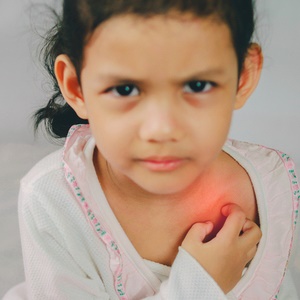
Researchers have added to a growing body of evidence that skin plays a major role in food allergies.
Their study of 62 children with eczema found that those with food allergies had skin irregularities not present in others.
Individualised treatment
Those irregularities included a lack of structural proteins needed to retain moisture and produce an effective skin barrier; increases in certain keratin proteins indicative of an immature skin barrier; and increased activation of type 2 immune genes, which are associated with allergic diseases.
The findings suggest that individualised treatment might help protect some patients with eczema (atopic dermatitis) from food allergies, according to the study authors.
"The skins of atopic dermatitis patients with food allergies show clear markers of a predisposition to allergic diseases and a faulty skin barrier," said lead author Dr Donald Leung. "They suggest that personalised treatment of these children may reduce the risk of developing both atopic dermatitis and food allergies."
Leung is head of paediatric allergy and immunology at National Jewish Health in Denver.
Eczema affects nearly 20% of children, causing dry, itchy and cracked skin. About 30% of kids with eczema develop food allergies.
Preventive steps
"The skin of atopic dermatitis patients loses water and dries out," Leung said in a news release. "It can crack like potato chips. Increasing evidence indicates that when food particles enter those cracks, they can promote the development of food allergies."
The findings suggest eczema patients who develop food allergies are a "distinct subset", Leung said.
"The first weeks after birth, when an infant goes from the watery environment of the womb to the dry air of the outside world, is particularly traumatic for an infant's skin. We believe early treatment to maintain moist skin and a healthy skin barrier is especially important for these patients," he said.
The skin-testing technique used in this study may help identify infants who are at risk for food allergies and allow for preventive steps, Leung said.
The study was recently published in the journal Science Translational Medicine.
Image credit: iStock




 Publications
Publications
 Partners
Partners















